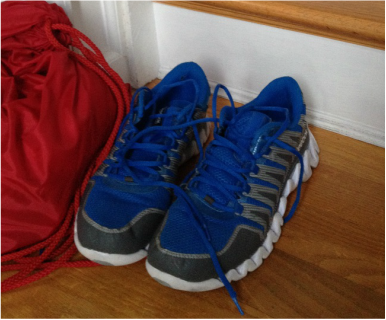
This harmless gym bag is not scary because of the teen boy scent emanating from it, although, by the end of the week I'm somewhat fearful of it. The bag does not concern Ryan because the texture of the bag is 100% nylon and not 100% Hollister cotton. The gym bag does not cause trepidation due to the dread of gym class and the fear of being picked last for a team. No, the gym bag causes my son to quiver with anxiety and fear when the bag itself, or it's contents, becomes....lost. Then the missing gym bag and the fear of retribution shakes my boy to his core.
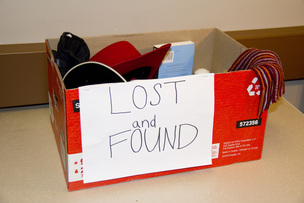
Every school has one, and depending on how forgetful the student body is, the Lost and Found could be a box, a bin, or a closet. Regardless of size and location, the Lost and Found is typically filled with a disorganized, random collection of books, hats, action figures, water bottles, a leftover winter mitten, and quite regularly, a gym bag. These items sit in the box sometimes for hours, days and months, waiting among the mess of other sad and discarded belongings for their owner to come and retrieve them. Trying to find something that is lost in such a disorganized mess is difficult, and sometimes, it's just not worth the search, so the owner claims it a "loss" and moves on. Eventually, the Lost and Not Found items make their way to the local landfill, never to be heard from again.
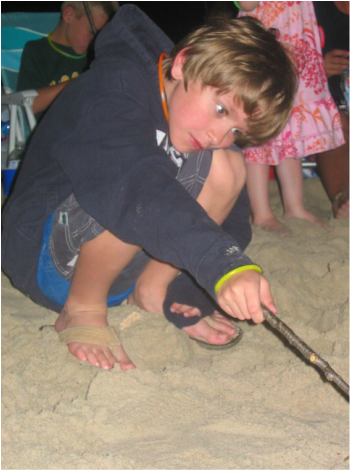
"Find your words" I use to say to the screaming, crying, melting down toddler. "Find your words" I use to say to the frustrated, bright, overstimulated preschooler. Little did I know, those behaviors, those screams, those cries were Ryan's "words", he was indeed communicating with me, but, I just wasn't listening. His frustration, his anger, his fear, were mixed among the words, jumbled in the Lost and Found, in plain sight, but, he was unable to retrieve them. I can only imagine his frustration.
Telling Ryan to "find his words" were poorly chosen words on my part. For Ryan, his words were not lost, he knew where they were, he just couldn't reach the bottom of the box. I don't know that Ryan's words have ever been lost. I think his words have always been "there", but, just like the messy, disorganized Lost and Found box, sometimes, rooting around and digging for what he is missing, is just too difficult, and it's not worth sorting through all the other words scattered about to find that one word that Ryan just can't reach. If the search for the word becomes too difficult, if there is just too much in the box to sort through, then Ryan discontinues the search, gives up and walks away. Frustrated, but, not the least bit concerned if that word ends up with the elusive mitten in a landfill.
Telling Ryan to "find his words" probably made him want to dump me head first into the Lost and Found box with the smelly missing gym sock and dirty water bottles. Ryan's words weren't "lost", he just had trouble retrieving them and expressing them. Many kids with an ASD struggle with expressive language, and Ryan is no different. Neither is Naoki Higashida who struggled to "find his words", yet, became a published author at the tender age of 13.
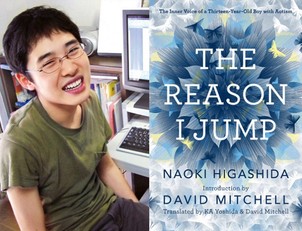
The words themselves may not be "lost", but, expressing the words may be difficult for many kids living with autism to "find". Screaming, stimming, scripting, and tantrums are all ways a child or an adult with an ASD is sharing their "words". The words may or may not be lost, but, finding them, pulling them out of the box and claiming them is often the hard part. Sure wish my "find your words" would have gotten lost somewhere between my brain and my big mouth.
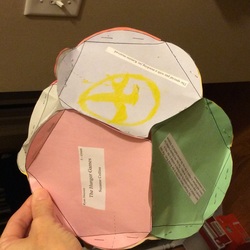
For about the past two years, Ryan has proclaimed his dislike for touching paper. It could be printer paper, the newspaper, or wrapping paper, paper was paper and he wasn't a fan. The boy suddenly had a sensory issue with all things paper (the trees are not complaining). The video below shows Ryan doing his word sort with paper word flashcards from two years ago. Ryan would bite the end of his fingers so he wouldn't "feel" the paper so much, but, he couldn't "find his words" to tell me how or why paper effected him so negatively. His "words" were displayed when he used his forearms to pick up papers, or shoved a paper at me with his foot, he was communicating his dislike for paper, but, due to his level of stress, the words were buried in the Lost and Found, hidden somewhere between his brain and his mouth. Until the dodecagon.
Ryan had no trouble finding his words, because I don't believe those words, or any others, were ever lost. In fact, all those years ago, during haircuts, and doctor's appointments and trying on new jeans, and wearing shirts with tags, Ryan's cries were telling me the same exact thing. These sensory sensations were being felt in his central nervous system and making him utterly miserable.
All those years of me telling Ryan, "find your words", he probably wanted to tell me, "find your ears". Ryan's words were not lost, they were just hidden amidst a bunch of other words and it was difficult for him to retrieve the right word with all his nerve endings poking through his central nervous system distracting him.
Stephen R. Covey said, "Most people do not listen with the intent to understand; they listen with the intent to reply.". I wanted Ryan to find his words, so I could reply. It was hard to reply to groans, moans, scripts, and meltdowns, it was Ryan's words that I wanted to hear even though I understood him loud and clear.
Whether it's a lost gym bag or a "lost" word, sometimes, it's easier for Ryan to "not worry about it" and move on. Digging through the jumbled words in his brain some days feels as pointless as digging through that heap of lost belongings in the Lost and Found. Ryan knows there are other ways to get his meaning out. Whether it's a script from Austin Powers, a paper shoved at me with his foot, or a moan when I grab the wrong glass for his grape juice, Ryan's words were never "lost", in fact, he has been using his "words" for years, I just wasn't listening.
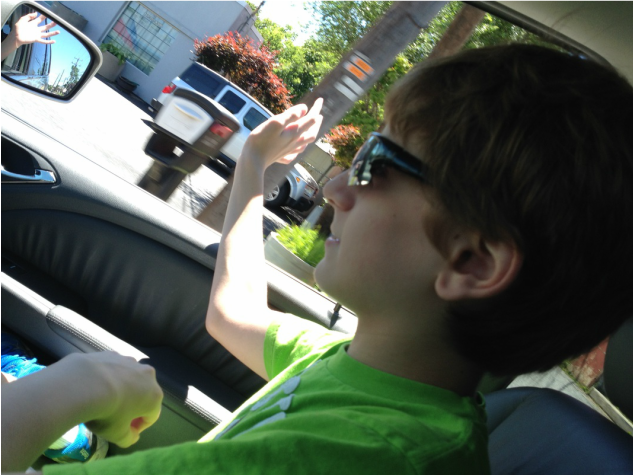


 RSS Feed
RSS Feed
